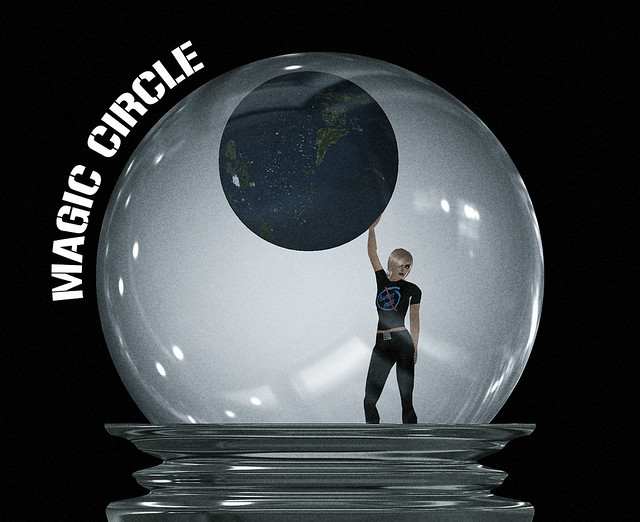
In ancient Greek thought, the temenos is a magic circle, a delimited sacred space in which special rules apply and which extraordinary events are free to occur. Stephen NachmanovitchThe phrase magic circle is used to describe the unique immersive environment of a virtual world or MMORPG, but I believe that avatar identity itself is the core domain of temenos. I am writing this post beyond the confines of Second Life or any other virtual world and it is likely that you are not reading this within one. The combination of magic, muse, technology and game mechanics that initially gives birth to one's visceral sense of avatar identity is not needed to sustain it. For me at least, avatar identity in itself is the essential sacred space where extraordinary events freely occur.

6 comments:
Agree. There are two kinds of people in the world : (A) Those who see their digital personas as nothing more than animated cursors (to be used for good or ill, as the desires dictate), as "things" or "tools" and (B) those who see them as cyberspace representations of themselves (their thoughts, deeds, integrity, ambitions, emotions, et al.).
To me those who stand out as being the more desirable-to-know of the two are those who relate casually and without self-consciousness on a purely avatar-to-avatar level. Such people never need to know the mundane details of the other puppeteer, and have no desire to break the Magic Circle.
"To be comfortable in one's own skin" can apply to the pixelated mesh as well as the flesh.
caliburn: You forgot about me! :D I see my virtual identity as a fictional character.
The Magic Circle also serves as a definition in experience. In drawing a Magic Circle, your first act is Separation (which is why a symbolic Knife is often used)- stuff is either "out there" or "in here."
And Botgirl... there are two kinds of people in this world - the kind that think there are only two kinds of people in the world, and the other kind :D
Caliburn might not have forgotten you, Bogirl. After all 'representations of themselves' could apply to digital people like yourself, Galatea Gynoid or myself. It could apply to OUR thoughts, deeds, integrity etc, rather than those of our primaries (assuming they differ).
It is interesting that you say 'I see MY identity as a fictional character'. In the context of the 'Lord Of The Rings' universe, Frodo Baggins is not an imaginary character and he is not just pretending to fight Gollum at the edge of Mount Doom. He really does fight Gollum. Just because there is another context, in which Elija Wood acted out a fight in front of a green-screen, in no way diminishes the reality- WITHIN THE CONTEXT OF THE LOTR UNIVERSE- of Frodo Baggins.
Similarly, within the context of online social networks/ online worlds, I argue you and I or not fictional. Yes, there is another context in which we are characters someone or some group is roleplaying. But, in that case, surely the appropriate thing to say is 'my PRIMARY (or whatever you call your RL self) sees me as a fictional character'?
Could we entertain the notion that it is, in fact, the PRIMARY that is fictional? There is something known as symbolic interactionism, which places great emphasis on the attitudes of others in shaping self-identity. Think how deep and complex the web of online social interactions surrounding a digital person can be. And everyone who is part of this web has a fairly consistent perception of this person.
But, if the information regarding 'who the primary is' is much more sparse (or none-existant), people are left to imagine what the primary is like, and one person's perception could differ dramatically from another's. So, when I try and imagine 'who Botgirl really is', the result is an imaginary person who exists only in my mind, whereas Botgirl is a digital person with a consistant identity known to many people.
Miso: That's really interesting. I tend to focus on what is inside the circle, but not what is excluded when drawing or entering it. In my experience, there's certainly both intentional and emergent aspects of moving into the consciousness of one persona or another. This is not only true between physical and virtual identities, but also in moving from role to role such as work, relationships, partys, etc. There is a core set of characteristics that are common to all of them, but also significant differences in what's layered on top.
Extropia: Yeah, language is tricky in expressing this stuff. I think that we might be talking about two variations of fictional. It seems to me that you are relating a non-fictional identity as one which is embedded within the magic circle of a consensus reality. On the ultimate level, all identities, RL and SL, are fictional in that the concepts we use to understand them are created by the mind, rather than independently existent within some objective reality. But on a relative level (stealing a bit from Buddhist philosophy) it is useful to speak in terms of fact and fiction based upon our mundane view of reality and the biology we are rooted in. For instance, if you stab Botgirl with a sword, no harm, no foul. If you stab the human you're causing actual harm and will likely go to jail.
As an addendum, please note the statement "two kinds of people in the world" was made tongue-in-cheek, but the ASCII winking smiley I attached to the comment was stripped out by the Blogger window.
→(grinning smiley inserted here)
Post a Comment